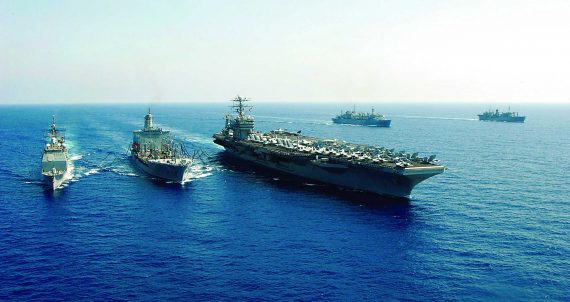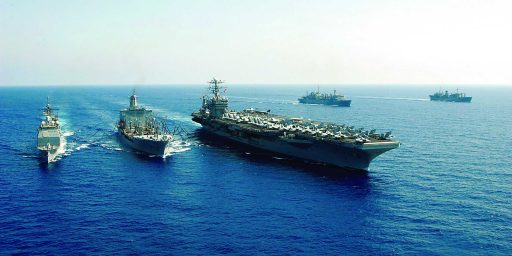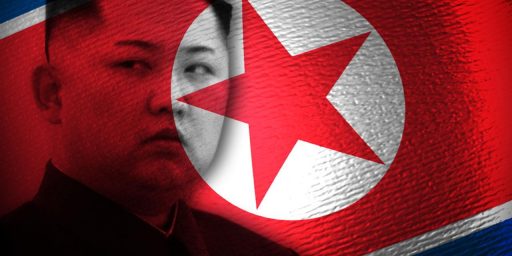U.S. Carrier Group Moves Toward Korean Peninsula
A warning to North Korea.
The United States is moving a Naval task force toward the Korean peninsula in response to recent missile tests and other North Korean actions:\
SEOUL — A U.S. Navy strike group led by the USS Carl Vinson aircraft carrier was making its way towards the Korean peninsula Sunday “to maintain readiness” as Kim Jong Un’s regime in North Korea prepared to mark key anniversaries this coming week.
North Korea is expected to hold a huge military parade on April 15 to celebrate the 105th birthday of its founding president, Kim Il Sung, and to mark the 85th anniversary of the creation of the Korean People’s Army on April 25 with similar fanfare.
Analysts expect the recent barrage of missiles to continue, and activities around its known nuclear test site have raised concerns North Korea may be preparing for a sixth nuclear test.
Over the weekend, North Korea said it was not afraid of military strikes like those the United States launched on Syria last week, saying it could defend itself with its “tremendous military muscle with a nuclear force.”
In this atmosphere, the Carl Vinson strike group, which includes a carrier air wing and two guided-missile destroyers, was ordered to travel to the “western Pacific.” When the group left Singapore on Saturday, it was bound for Australia before receiving the new orders.
“The U.S. Pacific Command ordered the Carl Vinson Strike Group north as a prudent measure to maintain readiness and presence in the Western Pacific,” said Dave Benham, a spokesman for the Pacific Command.
“The number one threat in the region continues to the North Korea, due to its reckless, irresponsible and destabilizing program of missile tests and pursuit of a nuclear weapons capability,” he said, according to the AFP news agency.
The Vinson group last month participated in joint drills with the South Korean military to prepare for a sudden change on the peninsula — including the collapse of the North Korean regime or an invasion.
North Korea has been testing medium-range missiles over recent months, and Kim in January said North Korea had “entered the final stage of preparation for a test-launch of an intercontinental ballistic missile” capable of hitting the mainland United States. In response, President Trump tweeted: “It won’t happen!”
During a 20-minute phone call Saturday, Trump told South Korea’s acting president, Hwang Kyo-ahn, that he had “in-depth discussions about North Korea’s serious nuclear problems and how to respond to them” during his summit meeting with Xi Jinping last week, according to the South Korean leader’s office.
Trump’s vow to act alone if China didn’t rein in North Korea, combined with the American president’s sudden decision to launch airstrikes on Syria last week, have some analysts speculating that North Korea could be next.
This isn’t the first time that the United States has moved naval or other military assets into the area in response to provocative North Korean actions. We’ve seen similar moves in the past in response to one of the DPRK’s many missile tests or tests of its nuclear weapons capability. Typically, that’s all that it amounts to, and the forces are quietly withdrawn after several weeks or more of an increased American presence in the area that is designed mostly to send a message to not only North Korea but also the Chinese and to America’s principal allies in the region, Japan and South Korea. Most likely, we’re looking at the same sort of situation here. Notwithstanding the bravado and tough talk, the odds that the Trump Administration is about to launch the first American military action against North Korea since the end of the Korean War sixty-five years ago strike me as being fairly low. For one thing, as I have noted repeatedly in the past, the risks of North Korean retaliation are fairly high and the likelihood that such retaliation could escalate into something that quickly spins out of control. Secondly, North Korea remains under the protection of China and any attack on the peninsula is likely to be viewed negatively by Beijing, something that could prove to be problematic with regard to the other important issues that the United States has with regard to that country. Finally, it’s hard to believe that a limited attack would do much to restrain an already irrational regime in Pyongyang. If anything, it’s more likely to inflame the situation than calm it down. In other words, even a limited military strike on North Korea like the one we saw last week in Syria seems unlikely.
The move is interesting for several reasons nonetheless as it comes just a day or so after the conclusion of a summit meeting between the President and President Xi of China at Mar-A-Lago during which North Korea was no doubt a substantial part of the discussions, although it’s not clear if President Xi was made aware of the decision to move the carrier group during those meetings. It also comes just a few weeks after Secretary of State Rex Tillerson said that “all options” were on the table when it came to American policy toward North Korea, a comment that led to immediate speculation that Trump might end up being more aggressive than his predecessors in responding to North Korea. As I said, the recent attack on Syria caused that comment to re-enter the public sphere and this move by American naval forces is likely to do the same. In any case, I guess we’ll need to keep an eye on things in Korea for awhile.





For the reasons you list and because it’s too soon after the strike on Syria. Trump hasn’t seen yet how much of a poll bump he’s going to get for Syria, and he doesn’t need another bump yet.
And that wasn’t very smart, given that North Korea is a rogue power that can get away with what it does because of its proximity to major South Korean population centers and its usefulness as a buffer zone to China.
Belligerent talk about North Korea simply plays into Pyongyang’s hands, since it can respond in a manner that delights its leader and everyone knows damn well that the United States does not have the ability to follow through. Bluffing is a lousy tactic when everyone knows that you’re bluffing.
Ahhhhh …. Trump has finally been clued-in to the fact that presidents always get a favorable bump in polling if they forget that crappy domestic politics stuff and go show military force where there’s little immediate chance of negative fall out.
Heck, if your party controls Congress, you don’t even have to ask for permission to do it either.
From your lips to God’s ears. Most of the skill in brinksmanship is knowing where “the brink” is. Jong-eun and Trump represent two relatively untested players and of the two, unfortunately, Jong-eun is the more likely party to show restraint.
@Pch101: I wish I had your confidence that Trump is bluffing. Again, from your lips to God’s ears.
I’m so boooored with pointless wars in the Middle East. Can’t we have a really bad war in the Far East?
We have no reason to believe that North Korea will suddenly get more reasonable if they have access to ICBMs — so, the only question at this point is how and when we act, rather than if. There aren’t good options, and they are getting progressively worse year by year.
We’ve tried diplomacy for decades, going back to the Clinton administration if not earlier. We have tried sanctions. We have tried to cajole the Chinese into curbing their dog, but they haven’t been willing to. And, while we don’t act, out of fear of the consequences, the consequences if we do act keep getting worse.
Right now we can either:
– Do nothing, and wait for something to change favorably (heart attack for Kim Jung-un?)
– Do nothing, and accept North Korea with the power to hit us with nuclear weapons.
– Escalate the tit for tat provocations until China has to act (would stationing nuclear weapons in South Korea be enough?)
– Minor air strikes (hopefully more effective than the cruise missiles to put easily repaired pot holes in an airstrip — the Syrians have already patched it, and are using it again)
– Major strikes (hey, there will be a parade soon, right? A military parade is a military target, maybe?)
– Invasion
– Assassination? (Does he move about enough? would someone better take his place?)
Oh, I don’t know. Invite Kim Jong-un for a state dinner and then just shoot him in the head before dessert. And then have Trump eat his dessert. That would send a message.
Fine, just move the carrier fleet, put another one off southern China (in the international waters they keep trying to claim), station nuclear weapons either in South Korea or off the coast, and announce a steadily increasing tariff on Chinese goods until they take care of their puppet or cut him off.
Yeah, let’s have another voluntary, preemptive war. Those work out so well.
we sabotaged Iran’s centrifuges with Stuxnet and put sanctions on them and then they made a deal, and gave all their nuclear material to Russia. No lives lost. Let’s try that with North Korea.
It should work–our president has the best people, the best words, and the best deals. 😀
@Gustopher:
Your second option, accept a Korea with nukes, subject to massive assured destruction if they do anything with them, while very bad, is no worse than your other options. It used to be called Mutual Assured Destruction (MAD, a fitting acronym). But in the case of us v/ N Korea, it would be far more one sided than mutual. The other options are either impractical (invasion) or likely to be ineffective while hardening their resolve.
Mutual deterrence has, so far, worked with Russia, China, Britain, France, Pakistan, India, and Israel. The downside is that it assumes rational leadership on all sides, which may not currently be the case. The long term plan, of course, is to rely on MAD short term while bringing the miscreant into the international community commercially and culturally. At the moment that seems to not be working well with Russia, much less NK.
At the moment our best options are probably to make nice with China and encourage South Korea to make the border as porous as possible. And remind NK occasionally that any arsenal they can realistically build doesn’t match a single U. S. ICBM with multiple warheads.
@gVOR08: Well said; ‘keep calm and carry on’.
There’s a reason why the Korean War ended in a stalemate after three years of combat.
The notion that the US can unilateral fix the situation is foolhardy, as is the belief that the Chinese can magically fix it for us if we twist their arms. North Korea is an enfant terrible that exploits its value as a buffer zone, and there isn’t anything that anyone can do to fix it without paying a severe price.
There’s always a decapitation strike. If we can locate Kim in a specific place with a high degree of certainty we could hit his location with Tomahawks. Best probably if we could sneak a sub up close to Pyongyang, which could be dicey given that the sea there is right up against China. Follow up with B-1s and B-52s to make the rubble bounce.
Of course God only knows what happens next. We can have shiploads of food en route. We can broadcast to the NK generals that there’s no reason they should die for Kim and remind them that their homes and units and tank toys can all be struck. Promise a Japan-style semi-demilitarized Korean peninsula to keep the Chinese from getting too nervous.
Of course all that is totally illegal under current US law not to mention international law. And there’s a good 60-70% chance it’ll turn into a massive shitshow.
@michael reynolds: It’s always problems with you, Reynolds. 😉
@gVOR08: making nice with China isn’t going to work — they would have to cut off all trade to North Korea to make further sanctions effective, or they would have to remove their dictator and replace him with a kinder, gentler dictator. All options that are difficult for them. We’ve tried to make nice, it hasn’t been nice enough.
China might be willing to do so if they got the South China Sea shipping lanes in the bargain, but that seems like a lot to give up.
I think I would rather risk a trade war with China than an actual fighting war in Korea. Playing nice hasn’t worked, how about a medium sized stick?
@gVOR08: The second option is worse. North Korea could implode, and if it does, it will likely lash out at the same time.
The North Koreans are not rational actors, and do not feel bound by international law. Or they have gone way out of their way to make everyone believe this, which might be a mistake. I’ll take them at face value.
A good outcome would be regime change, and putting North Korea under the Chinese nuclear umbrella, with no nuclear weapons of their own. It’s doable, but it has to come in large part from the Chinese.
A less good outcome would be a large regional conflict, but that would still be preferable to an unstable, irrational actor with nuclear weapons and the capacity to reach the US.
In the past the US leaders could call Kim Jong Un’s father and calm down his fears and paranoia. Today they are dealing with a lunatic who kills his own family members. What is needed there is a coup.